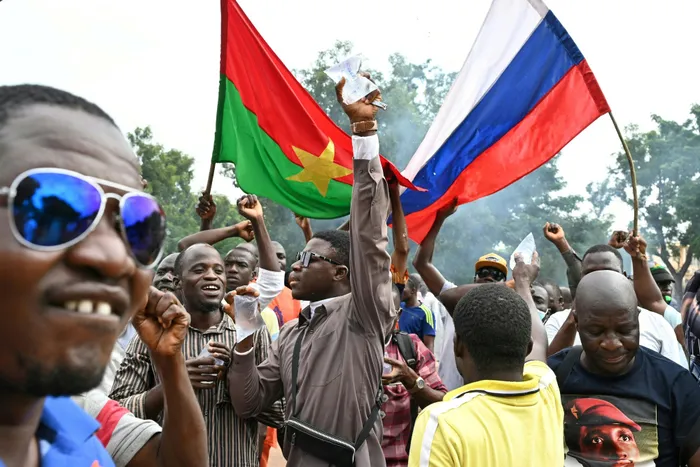Burkina Faso coup: human rights abuses in spotlight

Supporters of Burkina Faso's new junta leader Captain Ibrahim Traore in Ouagadougou on October 6, 2022. Traore has still not dealt with the jihadist insurgency, with terror groups believed to control about half of the country’s territory, the writer says. Instead, reports show that civilians have been subject to gross human rights abuses from both insurgents and government forces, the writer says. – Picture: Issouf SANOGO / AFP
By Sizo Nkala
When Captain Ibrahim Traore seized power through a military coup in Burkina Faso in October 2022 and declared himself the head of state, he blamed his predecessor, Colonel Paul Henri-Damiba, for failing to deal with the jihadist insurgency that was affecting the country.
Damiba himself had seized power in a military coup in January 2022 promising to address the terrorist attacks that were wreaking havoc across the country. Upon his inauguration, Traore promised to confront the terrorists and reclaim the territory they had seized over the years.
Since the start of the counter-insurgency operations in 2016, almost 20,000 people have lost their lives in Burkina Faso while two million people have been displaced.
However, a year and a half after Traore’s ascendancy, the going has proved quite tough in terms of quelling the security situation. The military government, which came to power in October 2022, has struggled to keep the situation under control, with terror groups believed to control about half of the country’s territory.
Its response to the insurgency has precipitated massive violations of human rights committed both by government forces and terrorist groups. According to the Global Terrorism Index of 2023, Burkina Faso witnessed a 50 percent increase in deaths caused by terrorism in 2022. Terrorist deaths rose from 1,135 in 2022 to 1,907 last year.
Over the past year, Islamist armed groups such as the al-Qaeda-linked Jama’at Nasr al-Islam wal Muslimin (JNIM) and the Islamic State in the Greater Sahara (ISGS) have executed deadly assaults on civilians in various areas including the towns of Dassa, Pissila, and Djibo.
Hundreds of people were killed, many were abducted and critical infrastructure such as roads, bridges, water pipes and communications were severely damaged, leading to acute food shortages and the spread of malnutrition in and around the affected areas.
In Djibo, a town of 300,000 people, almost 90 percent of the population was reportedly displaced due to terrorist attacks.
When the military government seized power at the end of 2022, it mobilised and recruited about 50,000 civilians into militia groups known as the Volunteers for the Defence of the Homeland (VDPs). Together with government forces, the militias have been going around wantonly killing unarmed civilians under the guise of counter-insurgency.
According to a recent Human Rights Watch report, almost 340 people, most of them civilians including women and children, were allegedly killed by government-backed forces while many others were injured since Traore took over.
Government forces have been accused of looting livestock such as goats and cows, demanding that citizens produce identity cards, and burning the homes of civilians they suspect to be working with terrorist groups. The Burkinabe government has also cracked the whip on the media in an attempt to evade accountability for how its forces have handled the security situation in the country.
In March last year, the government suspended France 24, a French international television news channel, for interviewing a leader of one of the terrorist outfits – al-Qaeda in the Islamic Maghreb. Two journalists working for French newspapers were ordered out of the country while an independent radio station, Radio Omega, was suspended in August last year for airing interviews of supporters of ousted Niger president Mohamed Bazoum.
As punishment for their reports on the security situation, several journalists received calls from the government informing them of their conscription to participate in the government’s counter-insurgency operation. This was ostensibly done to stop critical reporting on the government forces and thus keep the truth out of the public sphere.
Traore signed the general mobilisation order in April last year which gave powers to enlist any 18-year-old physically fit male citizen in the war effort against the terrorist groups.
Moreover, children’s right to education has been affected as a result of the fighting in the country. About 6,100 schools serving over a million children have reportedly been closed as operations became increasingly untenable.
It’s clear Traore’s government does not have the capacity to bring the in Burkina Faso under control. The country’s suspension from multilateral bodies such as the Economic Community of West African States (Ecowas) and the AU, and its isolation by the West, will deprive it of the financial and material support needed to execute its counter-insurgency operation more effectively.
Its membership in the Sahel Alliance, a new regional organisation it founded with Mali and Niger – two other countries affected by the jihadist attacks – in September 2023, will probably yield little in terms of effective support as Mali and Niger have also been isolated. The likely result is that Traore may soon be removed in a coup on the same grounds on which he seized power in October 2022, when he cited the government’s failure to end the insurgency.
There is an urgent need for Ecowas, the AU and the broader international community to intervene and protect unarmed Burkinabe civilians from both the insurgents and government forces.
Dr Sizo Nkala is a Research Fellow at the University of Johannesburg’s Centre for Africa-China Studies.